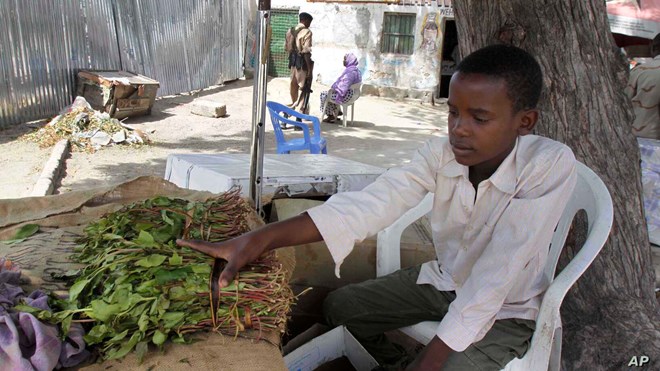
Source: VOA, Sunday March 22, 2020

The new coronavirus has woven itself into the daily lives of Somalis’ pocketbooks, hitting small businesses, including sellers of the herbal stimulant khat.
Khat, the red-stemmed, green-leafed plant that is chewed for its amphetamine-like properties, is grown in Kenya and Ethiopia but is very popular in Somalia, Djibouti and Yemen.
On Thursday, Somalia banned all international flights, including those carrying khat, for 15 days, as a part of measures the country has taken to prevent the spread of the coronavirus.
The normally bustling market in Mogadishu known as Beertakhat, which translates into khat farm, has been practically deserted because of the suspended flights.Hundreds if not thousands of Somalis who directly or indirectly depended on the khat business could be affected by the decision.
Despite its popularity, khat markets have always been fragile because there are no stockpiles available. Traditionally, it has to be sold fresh.
A mother’s income
One khat seller in Mogadishu, Faadumo Abdurahman, told VOA Somali that her family’s livelihood had been jeopardized because of the flight stoppage, which she said had come without warning.
“Vending khat was the only way I managed to feed my children. Therefore, this decision came at a time I was not prepared for,” she said.
“One side, the suspension of khat flights would hit us hard economically. On the other hand, I see the decision as temporary and lifesaving,” said liban Mohamed Isse, a spokesman for khat traders.
Not only Somali traders and consumers but also growers of khat in Kenya, where it is called “miraa” and nicknamed “green gold,” are feeling the economic effects of the coronavirus.
Normally, more than 15 cargo flights of khat arrive in Mogadishu and other major cities in the country every day from Kenya. Somali anti-khat activist Abukar Awale said the crop is worth $840 million a year.
“In research we have done only on the khat that is air transported into Somalia, at its peak, we have recorded 35 cargo flights, carrying about 95,000 bags of khat a day, which have a total retail value of $400,000,” Awale said.
